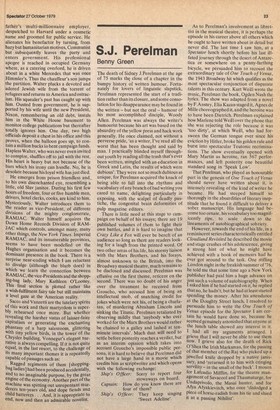S.J. Perelman
Benny Green
The death of Sidney J.Perelman at the age of 75 marks thc close of a chapter in the bumpy history of written humour. Fortunately for lovers of linguistic slapstick, Perelman represented the start of a tradition rather than its closure, and some consolation for his disappearance may be found in the written — but not the oral — humour of his most accomplished disciple, Woody Allen. Perelman was always the writer's humourist because his art was based on the absurdity of the yellow press and hack work generally. He once claimed, not without a perverse pride, 'as a writer, I've read all the worst that has been thought and said by man. I practically blinded myself throughout youth by reading all the trash that's ever been written, mingled with an education in Greek and Latin, the results of which were dubious'. They were not so much dubious as unique, for Perelman acquired the knack of being able to fall into the rhythms and vocabulary of any branch of bad writing you cared to name, delighting particularly in exposing, with the scalpel of deadly pastiche, the congenital brain deformities of pulp magazine editors.
There is little need at this stage to campaign on behalf of his essays; there are 19 published volumes of them to fight their own battles, and it is hard to imagine that Crazy Like a Fox will ever be bereft of an audience so long as there are readers looking for a laugh from the printed word. Of two other areas of his life, his stormy liaison with the Marx Brothers, and his forays, almost unknown to the British, into the Broadway musical theatre, much remains to be disclosed and discussed. Perelman was effusive on the first theme, reticent on the second. There was no doubt of his anger over the treatment he received from Groucho, who accused him of being an intellectual snob, of snatching credit for jokes which were not his, of being a charlatan, of murdering Abraham Lincoln and sinking the Titanic. Perelman retaliated by observing mildly that 'anybody who ever worked for the Marx Brothers would rather be chained to a galley and lashed at tenminute intervals'. Much dust will need to settle before posterity reaches a verdict, but as an interim opinion which takes into account Groucho's impossible public persona, it is hard to believe that Perelman did not have a large hand in a movie which credits him as scriptwriter and which opens with the following exchange: Ship's Officer: Sorry to report four stowaways on board. Captain: How do you know there are four of them?
Ship's Officer: They keep singing 'Sweet Adeline'. As to Perelman's involvement as librettist in the musical theatre, it is perhaps the episode in his career above all others which he ought to have written about in detail but never did. The last time I saw him, at a Spectator lunch shortly before his last illfated journey through the desert of Antarctica or somewhere on a penny-farthing bicycle, we persuaded him to recount the extraordinary tale of One Touch of Venus, the 1943 Broadway hit which qualifies as the most spectacular conjunction of disparate talents in this century. Kurt Weill wrote the music, Perelman the book, Ogden Nash the lyrics. The show was adapted from a novel by F.Anstey, Elia Kazan staged it, Agnes de Mille choreographed it, and the heroine was to have been Dietrich. Perelman explained how Marlene told Weill over the phone that She was rejecting the role because it was 'too dirty', at which Weill, who had forsworn the German tongue ever since his eviction by Hitler, broke his golden rule and burst into spectacular Teutonic recriminations. The show eventually opened with Mary Martin as heroine, ran 567 performances, and left posterity one beautiful standard song in 'Speak Low'.
That Perelman, who played an honourable part in the genesis of One Touch of Venus should never have written about it, is intensely revealing of the kind of writer he became. He had steeped himself so thorougly in the absurdities of literary ineptitude that he found it difficult to deliver a sober manuscript. His language had become too ornate, his vocabulary too magnificently ripe, to scale down to the lineaments of autobiographical sobriety.
However, towards the end of his life, in a reminiscent series characteristically entitled Cloudland Revisited he described the movie and stage crushes of his adolescence, giving a strong hint of what he might have achieved with a book of memoirs had he ever got around to the task. One stifling London night in the freakish summer of '76, he told me that some time ago a New York publisher had paid him a huge advance on just such a volume of autobiography, When I asked him if he had started on it, he replied that no, he hadn't, but he had at least started spending the money. After his attendance at the Doughty Street lunch, I resolved to pursuade him to write the One Touch of Venus episode for the Spectator I am certain he would have done so, because he seemed genuinely astonished that anyone at the lunch table showed any interest in it. I had all my arguments arranged. I grieve that I will never be able to use them now. I grieve also for the death of Rick O'Shea the Irish Marksman, for the passing of that member of the Raj who picked up a jewelled knife dropped by a native janissary, and 'returned it to him with cringing servility — in the small of the back', I mourn for Lafcadio Mifflin, for the theatre management of Savacool and Thaumaturge, for Undaprivolo, the Masai hunter, and for Afya Afyakievitch, who once 'dislodged a piece of horse-radish from his tie and shied it at a passing Nihilist'.


































 Previous page
Previous page